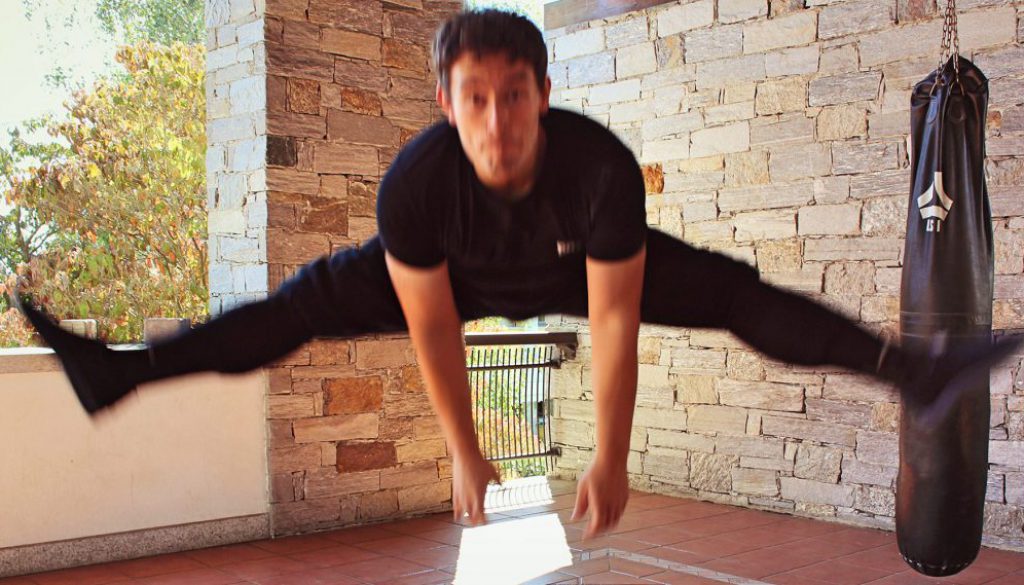Conditioning check for flexibility
The advantages of good flexibility in martial arts
Good conditioning for flexibility requires long times, constancy, commitment and remarkable patience: it is for this reason that many aspiring practitioners tend to underestimate (if not even completely avoid) these kinds of activity.
The fact is that a flexible body offers crucial advantages in terms of combat and training aptitude:
- Increased resistance – An increased resistance to joint levers (wrists, elbows, etc., read Chin Na) and this means more time to react
- Improved elasticity – A greater elasticity and therefore resistance to direct and indirect damage (falls, etc., read Everything you should know about breakfalls)
- Better performances – Indirectly, a good flexibility offer access to greater power and speed (the movements do not undergo the passive brake of a limited mobility)
- A wider range of action – Good elongations allow us to access a greater amplitude of movement and technique (head kick, etc., read The use of legs in a real fight)
- Longer operativity – When we are exhausted (our body is stiffening, etc.), having tendons and muscles more performant gives us a further margin of operativity
- Recovery capability – Both in terms of training both in case of injury, if we are more flexible we generally have shorter recovery times
- Mental positivity – The state of our body affect our mood, the more we get to tighten up quickly, the more our mental disposition will be negative (Yoga and Qi Gong work insistently on this principle)
- …
A note by Master Kongling – Flexibility is like a house, once built, it has its own durability but needs constant and periodical maintenance. It is important to do not underestimate the development of our elongation capability: it is not a skill that should be exploited only when you have a natural talent related to it (read Natural talent and martial arts).
The perfect flexibility parameters for a practitioner: a test
In 6 Dragons Kung Fu, good body elasticity / flexibility must respond to very stringent parameters, dictated by the inevitable need for application outside predetermined contexts (read for example Use of legs in a street fight). In this regard let’s see a “test”, a “check” to evaluate our preparation:
- 20% higher – The level of flexibility that we can reach during training must be (at least) 20% higher than the one we choose to use in combat
- 75% of performance – 70-75% of our performances must be at our disposal even in a total absence of warm-up / stretching (eg. in self-defense after sudden aggression, read Self-Defense: is it possible to always be ready to fight)
- Resist against a force – Flexibility must also be able to operate / resist under any force coming from any direction (opposite, lateral, etc.); it is for this reason that we cannot work only on relaxation doing our stretching sessions (read How to correctly perform stretching)
- Always effective – Our flexibility must be dynamically accessible from any position (in flight, in ground combat, etc.); during combat, it is absolutely normal to find ourselves in random, unnatural and unexpected positions
- Instantly activable – Flexibility must be instantly and instinctively available (no preparations, no breathing, no relaxation, no concentration, etc.)
To achieve this kind of results, we need what (at the dawn of the Shaolin Temple) Bodhidharma called “tendons transformation”: a gradual mutation of muscles, tendons (etc.) capable to support our elongation in the most challenging contexts.
The path (read ) to reach this level of performances (that are different from 90% of all human physical / sports activities) is a work of:
- Breathing (read )
- Relaxation (read Meditation method 1)
- Advanced body control (through Yoga, Qi Gong, etc. practices, read Advanced body control)
Related video courses
- Back and Neck pain treatment – A good starting point to resolve the body problems before starting tendons transformation
In-depth articles
- The easiest method to do the side split – An effective way to obtain a full split
- How to correctly perform warm-up – The fundamental activity before any kind of elongation
Questions
Reply in the comments and share your experience:
- Are you within the 6DKF’s flexibility parameters?
Author: Master Kongling
Founder of 6 Dragons Kung Fu.
How to master 6 Dragons Kung Fu?
Are you searching for:
- Daily training exercises?
- Synthetic theory and concepts?
- A step by step path from white to black belt?
- A path (clear, consequential and gradual) designed to build real martial skills?
- A direct contact with Master Kongling?
Go to our Patreon page and choose a training plan: starting from the Practitioner level, you will gain access to all this and much more.
Inside each Premium Lesson, you will receive the same teaching (practices, tips, concepts, small secrets and corrections) reserved to the live students of Master Kongling.
Important - Once a certain number of registrations are reached, no other participants can be accepted. For more information write to: [email protected].










April 12, 2019 @ 9:39 pm
What is the difference between Yoga and combat flexibility?
June 5, 2019 @ 12:08 pm
Ok
June 5, 2019 @ 6:35 pm
😉
June 9, 2019 @ 2:36 am
These are too high requirements
June 13, 2019 @ 2:13 am
Not too much if you train diligently.
May 1, 2022 @ 11:16 pm
I am trying!
July 12, 2023 @ 2:14 am
I am starting to fit!
July 16, 2023 @ 3:45 am
😉
October 18, 2024 @ 10:49 am
Now I can do a full split! Thanks!
November 17, 2024 @ 7:35 pm
😉